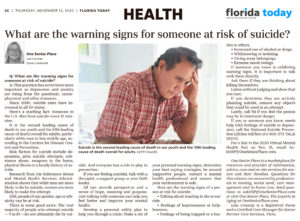
 Lisa Conway, One Senior Place – Special to FLORIDA TODAY
Lisa Conway, One Senior Place – Special to FLORIDA TODAY
This is a new Q&A feature provided by One Senior Place, a marketplace for resources and a provider of information, advice, care and on-site services for seniors and their families, located in Viera.
Q: What are the warning signs for someone at risk of suicide?
 A: This question has never been more important as depression and anxiety are rising from the pandemic, unemployment and other stressors.
A: This question has never been more important as depression and anxiety are rising from the pandemic, unemployment and other stressors.
Since 2000, suicide rates have increased in all 50 states.
Here’s a startling fact: Someone in the U.S. dies from suicide every 12 minutes.
It is the second leading cause of death in our youth and the 10th leading cause of death overall for adults, particularly white men in late middle age, according to the Centers for Disease Control and Prevention.
Risk factors for suicide include depression, prior suicide attempts, substance abuse, weapons in the home, physical illness or a family history of suicide.
Research from the Substance Abuse and Mental Health Services Administration shows that while men are more likely to die by suicide, women are more likely to make the attempt.
Still, people of any gender, age or ethnicity can be at risk.
There is some good news: The vast majority of people who attempt suicide — 9 in 10 —do not ultimately die by suicide. And everyone has a role to play in prevention.
If you are feeling suicidal, talk with a therapist, a support group or your faith leader.
All can provide perspective and a sense of hope, meaning and purpose. Just talking with someone can help you feel better and improve your mental health.
Develop a personal safety plan to help you through a crisis: Make a list of your personal warning signs, determine your best coping strategies, be around supportive people, contact a mental health professional and ensure that your environment is safe.
Here are the warning signs of a person at risk for suicide:
- Talking about wanting to die or suicide.
- Feelings of hopelessness or helplessness.
- Feelings of being trapped or a burden to others.
- Increased use of alcohol or drugs.
- Withdrawing or isolating.
- Giving away belongings.
- Extreme mood swings.
If someone you know is exhibiting warning signs, it is important to talk with them directly.
Ask them if they are thinking about killing themselves.
Listen without judging and show that you care.
If you determine they are actively planning suicide, remove any objects that could be used in an attempt.
Lastly, call 911 if you feel the person may be in imminent danger.
If you or someone you know needs help with feelings of suicide or depression, call the National Suicide Prevention Lifeline toll free at 1-800-273-TALK (8255).
For a link to the 2020 Virtual Mental Health Fair on Nov. 15, email AskOSP@OneSeniorPlace.com.
# # #
One Senior Place is a marketplace for resources and a provider of information, advice, care and on-site services for seniors and their families. Questions for this column are answered by professionals in nursing, social work, care management and in-home care. To submit a question, send an email to askOSP@OneSeniorPlace.com or visit One Senior Place, The Experts in Aging at OneSeniorPlace.com.
Lisa Conway is a Registered Nurse and a Certified Care Manager for Senior Partner Care Services in Viera.


